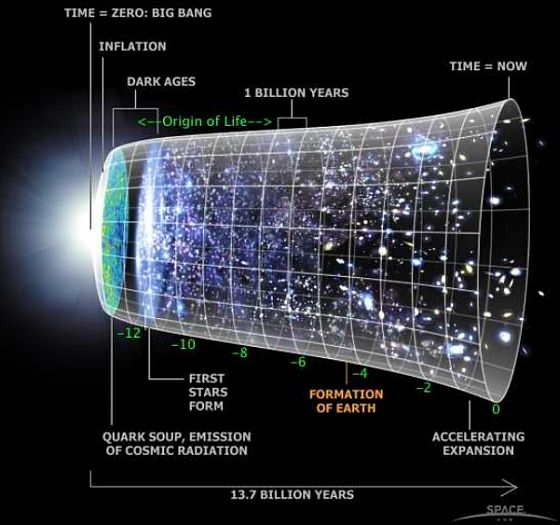
Panspermia — the hypothesis that life exists throughout the universe — has been kicking around among astrophysicists for decades, one of its most recent and prominent proponents being Stephen Hawking.
A couple of geneticists, Alexei Sharov of the National Institute on Aging in Baltimore, and Richard Gordon of the Gulf Specimen Marine Laboratory in Florida, have now proposed that the rate at which evolution advances necessitates that life must be much older than the Earth and may trace back to within the first 2 billion years of the universe’s existence.
They argue that life grows in complexity at a rate that parallels Moore’s Law.
Moore’s Law is the observation that computers increase exponentially in complexity, at a rate of about double the transistors per integrated circuit every very two years. If you apply Moore’s Law to just the last few years’ rate of computational complexity and work backward, you’ll get back to the 1960s, when the first microchip was, indeed, invented.
Sharov and Gordon argue that similar exponential growth applies to genetic complexity with a doubling in complexity every 376 million years. Following this cycle back through the course of evolution would trace life’s origin to about 9 billion years ago. The Earth is only 4.5 billion years old.
This cosmic time scale for the evolution of life has important consequences: (1) life took a long time (ca. 5 billion years) to reach the complexity of bacteria; (2) the environments in which life originated and evolved to the prokaryote stage may have been quite different from those envisaged on Earth; (3) there was no intelligent life in our universe prior to the origin of Earth, thus Earth could not have been deliberately seeded with life by intelligent aliens; (4) Earth was seeded by panspermia; (5) experimental replication of the origin of life from scratch may have to emulate many cumulative rare events; and (6) the Drake equation for guesstimating the number of civilizations in the universe is likely wrong, as intelligent life has just begun appearing in our universe.
Much as the following observation might offend the likes of Richard Dawkins and his ilk, it’s hard not to see in this new view of the origin of life some echoes of ancient religious assertions about the uniqueness of human beings and about the intimate connection between life and existence.
The image here is of a universe seeded with life which then coalesces in a crescendo of complexity on Earth, leading to the appearance of humanity as in some sense a fulfillment of the universe’s reason for existence. Small wonder that as the fruit of such a ‘design’, humans would become fascinated by ideas about divine causality.
At the same time, if we really are this isolated beacon of intelligence, then so much greater is the irony about how we choose to live.
After 9 or even 12 billion years of evolution spanning the universe, we arrive at this: Gangnam Style, Justin Bieber, and Generation Text? Climate change, mass extinction of species, and destruction of the ethnosphere? Is this a cosmic plan or a cosmic joke?


Of course, to be really off the wall one should join this fantasy of existence to the original Moore’s Law observation and come to the conclusion that the purpose of the universe is to produce an intelligence based upon digital computing. Does that make the iPhone the highest order of excellence in the universe?
Yeah, “we arrive at this: Gangnam Style, Justin Bieber, Generation Text, Climate change, mass extinction of species, and destruction of the ethnosphere”; but We (as a collective) also arrived at antibiotics and vaccines, Wolfram’s cellular automata, at Umberto Eco’s wonderful novels, at Wikileaks, Free Software, Carl Sagan’s Cosmos and Fritjof Capra’s The Web of Life; and this website, for that matter. Evolution is indeed a tortuous and messy process, full of suffering for individuals, but not everything is as bleak and I think we actually have reasons to say that as a species we have never done better.
Cheers
My summary of the state of humanity might be a bit glib, but if one is going to generalize about the species then it makes sense to look at those things that are broadly true — not the accomplishments of exceptional individuals. For instance, if one was to compare the use of English by soldiers writing letters during the American Civil War with English in current text messaging, that would seem to provide a strong basis for suggesting that language skills had declined over the last 150 years. No doubt literacy will have greatly increased during the same period, but I don’t know whether vocabulary would have increased. Moreover, I have little doubt that the ability among both the literate and illiterate to quote from memory, lines from literary sources (the Bible and elsewhere) would have significantly diminished. The ability to draw upon popularized religious and philosophical maxims, repeat parables and other sayings, has been replaced with the ability to regurgitate trivia.
The general trend, as I see it, is that the more people’s outward material conditions improve, the less psychologically developed they become. The ability to rely on external resources diminishes the need to cultivate internal resources.